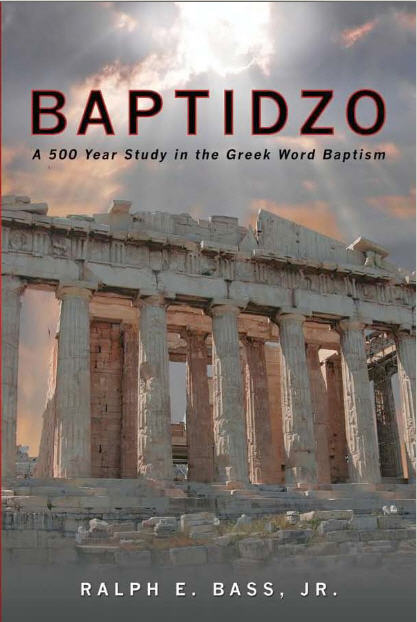
Hi, My Name Is Ralph Bass...This Is My Library


In our study of the history of Baptism, we must ask, what does BAPTIDZO mean? And very importantly, what does it not mean? These are critical question that must be asked in order to understand Christian baptism. We will address these two questions with some thoroughness in the pages ahead.
Through the history of Baptism, what is the “act” of Baptism? Indeed, is baptism essentially an “act” at all? Several authors have answered that question in the affirmative and have concluded that it is an act. But which act?
The Baptists answer these questions on the “act” of baptism saying:
Through the history of Baptism, what is the “act” of Baptism? Indeed, is baptism essentially an “act” at all? Several authors have answered that question in the affirmative and have concluded that it is an act. But which act?
The Baptists answer these questions on the “act” of baptism saying:

Subscribe to this Site
History of Baptism

“Dipping is Baptizing, and Baptizing is Dipping.” Tractate by A. R., London, 1644 - This document was introduced into America by Roger Williams.
“The word baptize necessarily includes in its signification dipping, and that Christ by commanding to baptize has commanded to dip only.” Pg 96, John Gale
“When our Lord says, ‘go, baptize,’ he speaks the language of legislation; he delivers Divine law. Does Jehovah make use of a term which properly signifies dipping? He means as he speaks and requires immersion.” Abraham Booth, London, 1711. Notice the equivocation, to command dipping requires immersion.
“The idea of dipping is in every instance….” Pg 46, F. A. Cox, 1824.
“BAPTIDZO, in the whole history of the Greek language, has but one [meaning]. It not only signifies to dip or immerse, but it never has any other meaning.” Alexander Carson, Baptist Board of Publication, Philadelphia, 1853. Again, notice the transition from dip to immerse.
“In all translations of classical works BAPTIDZO is rendered, dip, immerse.” Pg 10, R. Fuller, Southern Baptist Board of Publications, Charleston, 1859. Which is it, dip or immerse?
“The word baptize necessarily includes in its signification dipping, and that Christ by commanding to baptize has commanded to dip only.” Pg 96, John Gale
“When our Lord says, ‘go, baptize,’ he speaks the language of legislation; he delivers Divine law. Does Jehovah make use of a term which properly signifies dipping? He means as he speaks and requires immersion.” Abraham Booth, London, 1711. Notice the equivocation, to command dipping requires immersion.
“The idea of dipping is in every instance….” Pg 46, F. A. Cox, 1824.
“BAPTIDZO, in the whole history of the Greek language, has but one [meaning]. It not only signifies to dip or immerse, but it never has any other meaning.” Alexander Carson, Baptist Board of Publication, Philadelphia, 1853. Again, notice the transition from dip to immerse.
“In all translations of classical works BAPTIDZO is rendered, dip, immerse.” Pg 10, R. Fuller, Southern Baptist Board of Publications, Charleston, 1859. Which is it, dip or immerse?
Let's Look Inside
the Book

“BAPTIDZO, in the whole history of the Greek language, has but one meaning. It signifies to dip or immerse, and never has any other meaning.” pg 13, M. P. Jewett, Boston, 1854. The mixing of the acts dipping and immersing is common with these writers.
The problem with these definitions is this: dip and immerse are two words that cannot be interchanged. To dip is to place in and remove quickly. Immerse is a condition of “in-ness” or envelopment that lacks the intent or power of removal. To dip is not to immerse and to immerse is not to dip. Each word has a distinct and different meaning.
These various translations of BAPTIDZO in the history of Baptism, although not consistent with each other, are the common ones in Baptists circles. The position of this book is that BAPTIDZO is not an act but a changed condition, state, result or an effect accomplished brought about by any one of several possible acts.
Those who are commonly called Baptists, define BAPTIDZO wholly as an act. However, as we have seen, through the years they have not agreed as to what that act is specifically. A few suggested acts would be: to imbathe (an act), to overwhelm (a condition), to plunge (an act), to submerge (a condition), to dip (an act) and to immerse (a condition). In recent years they have more commonly adopted dip (an act) as the proper mode of baptism, but surprisingly, they inevitably spell it i-m-m-e-r-s-e (a condition—of envelopment). The reason for this is simple, in the history of Baptism BAPTIDZO does not mean to dip—BAPTO does. However, since the Bible does not use the word BAPTO to describe a Christian baptism, that creates a problem. Yet for the Baptists, dip (to lower then raise up again rather quickly), is the perfect word because that is precisely what they do in their baptisms. Unfortunately, it is not the word used in the Bible. “All Greek writers refuse to interchange BAPTIDZO and BAPTO ; the Holy Spirit persistently refuses to employ BAPTO, or to interchange it, in a single instance, with BAPTIDZO in speaking of Christian baptism….”
So, immerse has become the word of choice; and it is not a bad translation if you understand what immerse means—to place in (a state of “in-ness” or envelopment) and leave in. But BAPTIDZO does not possess the intent or power to remove from this condition of envelopment—and thereby makes a poor substitute for dipping.
This is quite problematic for Baptists since they don’t actually immerse. As stated, immerse means to place in some fluid without limitation to time. In other words, the Baptists believe that “the Holy Spirit has employed a word which requires, absolutely, disciples to be put under water without making any provision for their withdrawal….” BAPTO (dip) solves that problem, but it is not the Biblical word used for Christian baptism.
The history of Baptism does not support the baptist position.
The problem with these definitions is this: dip and immerse are two words that cannot be interchanged. To dip is to place in and remove quickly. Immerse is a condition of “in-ness” or envelopment that lacks the intent or power of removal. To dip is not to immerse and to immerse is not to dip. Each word has a distinct and different meaning.
These various translations of BAPTIDZO in the history of Baptism, although not consistent with each other, are the common ones in Baptists circles. The position of this book is that BAPTIDZO is not an act but a changed condition, state, result or an effect accomplished brought about by any one of several possible acts.
Those who are commonly called Baptists, define BAPTIDZO wholly as an act. However, as we have seen, through the years they have not agreed as to what that act is specifically. A few suggested acts would be: to imbathe (an act), to overwhelm (a condition), to plunge (an act), to submerge (a condition), to dip (an act) and to immerse (a condition). In recent years they have more commonly adopted dip (an act) as the proper mode of baptism, but surprisingly, they inevitably spell it i-m-m-e-r-s-e (a condition—of envelopment). The reason for this is simple, in the history of Baptism BAPTIDZO does not mean to dip—BAPTO does. However, since the Bible does not use the word BAPTO to describe a Christian baptism, that creates a problem. Yet for the Baptists, dip (to lower then raise up again rather quickly), is the perfect word because that is precisely what they do in their baptisms. Unfortunately, it is not the word used in the Bible. “All Greek writers refuse to interchange BAPTIDZO and BAPTO ; the Holy Spirit persistently refuses to employ BAPTO, or to interchange it, in a single instance, with BAPTIDZO in speaking of Christian baptism….”
So, immerse has become the word of choice; and it is not a bad translation if you understand what immerse means—to place in (a state of “in-ness” or envelopment) and leave in. But BAPTIDZO does not possess the intent or power to remove from this condition of envelopment—and thereby makes a poor substitute for dipping.
This is quite problematic for Baptists since they don’t actually immerse. As stated, immerse means to place in some fluid without limitation to time. In other words, the Baptists believe that “the Holy Spirit has employed a word which requires, absolutely, disciples to be put under water without making any provision for their withdrawal….” BAPTO (dip) solves that problem, but it is not the Biblical word used for Christian baptism.
The history of Baptism does not support the baptist position.
Introduction












































































































